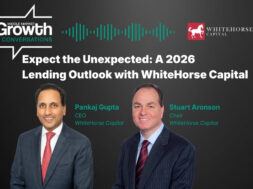Revolutionizing Middle-Market Deal Sourcing: The Role of Artificial Intelligence
Cyndx Founder and CEO Jim McVeigh shares how AI is changing the deal sourcing game

Sourcing new deal opportunities has traditionally been a time-consuming process that relied heavily on personal networks or banker relationships.
With a lack of available private market corporate data on a company’s financials, leadership team, capital raising history and comparable company valuations, investors are often required to spend a significant amount of time researching many different, and often unstructured, data sets to identify suitable opportunities to invest in.
This section of the report is sponsored by Cyndx andoriginally appeared in the Middle Market Executive Summer 2023 edition.
This has been particularly true for private companies in the middle market. While efficiencies begin to exist for the largest players, many middle-market companies are too small or lack the resources to appropriately disclose the necessary information for an investor to find them. It’s in this middle market where the best opportunities are often found—yet sufficient information remains limited.
In recent years, artificial intelligence has been changing all that and creating efficiencies in deal sourcing on an exponential basis. Tools that utilize AI for finding and evaluating deals—such as what we’ve created at Cyndx—allow investors to search for potential companies and uncover insights about new investment opportunities at a size and scale never seen before.
For example, Cyndx has over 22 million global public and private companies in our database, which provide an unparalleled view into the private capital markets. This wouldn’t be possible without using AI and natural language processing (NLP). This scale allows Cyndx to create large cohorts around any company or concept to enhance the accuracy of our AI predictions.
So, what does this mean for middle-market bankers, venture capital and private equity firms, and companies seeking investment? How exactly is AI being used and how is it changing the way they think about deals?
Advances in AI and NLP technologies simplify investors’ deal sourcing and investment strategy with tools that help quickly identify and access the right companies. Consequently, the efficiency of the private market will increase, while the risks associated with it will decrease over time.
As digitization increases access to global corporate data, AI is being used to evaluate investment opportunities more efficiently. Access to unstructured corporate data is growing exponentially; market intelligence firm IDC projects it will make up more than 80% of global data by 2025. However, this poses a challenge for businesses as they try to glean insights and gain a competitive advantage from all the new and existing data. Having the data is no longer the problem—structuring it and knowing what to do with it is.
Game-Changing Technology
The use of AI and NLP is allowing companies and investors to quickly understand vast amounts of unstructured data and obtain unique insights. Properly trained AI can help investors identify or recognize patterns within data and adapt to changes in those data sets, while NLP enables systems to understand human language and the emotion behind the text.
Combined, AI and NLP technologies allow investors to make more informed investing decisions or better identify and classify investment opportunities. For example, Cyndx’s Projected to Raise algorithm identifies with 86% precision when a company is likely to need capital, without having access to a company’s financial projections. This allows users or customers to identify transactions before they happen so that they can participate in that potential transaction.
Related content: 4 Deal Sourcing Trends Shaping 2023
Research that would normally take months of manual labor can now be done in seconds. Investors can look at multiple factors and understand the influence they have on one another when making a potential investment decision—i.e., bankers can look at where an executive worked historically, the number of patents filed (as well as who owns competitive patents), acceleration of capital into a particular space, lines of business that are supported, education of the founding team and the experience of the investment partners, among other information.
As a result, investors can gain a 360-degree perspective on a company’s associations and its competitive landscape, and AI is bringing in new data sets that provide a deeper and instantaneous picture of a company or industry ecosystem. This approach goes beyond the standard classification and uncovers—through dynamic mapping—the most relevant concepts associated with any one company, even for an extremely niche sector. With this technology, investors now uncover unique opportunities in a record amount of time and can maintain a consistent deal flow.
AI is also changing the game for entrepreneurs and company owners who can reap the same benefits when looking for the right strategic partners for their company. Finding the best investor or the most attractive business opportunity and conducting the appropriate level of due diligence has traditionally been a highly manual and time-consuming process for entrepreneurs as well. Companies don’t always have access to the relevant information necessary to make the right decision as it is often opaque or unavailable. With AI’s ability to recognize patterns and adapt to changes within data sets and NLP’s ability to pull sentiment from the data, entrepreneurs can quickly use these innovative technologies to match them with the right investors.
AI is also changing the game for entrepreneurs and company owners who can reap the same benefits when looking for the right strategic partners for their company.
AI and NLP tools significantly reduce the time and energy spent on private capital market research and due diligence by automating the research and analysis processes. Furthermore, with AI and NLP’s analytics and automation advantages, entrepreneurs can quickly identify the right funding opportunities, while investors can identify suitable private market investments. Neither will have to worry about missing out on potential funding or investment opportunities.
Today, AI and NLP tools provide greater visibility into the private market and improve the discovery of acquisition targets while reducing the time spent evaluating a business opportunity. As these tools become more widespread, the impact on middle-market deal sourcing will be undeniable.
Jim McVeigh has more than 20 years of investment banking experience at Salomon Brothers, DLJ, Credit Suisse and most recently Bank of America/Merrill Lynch, where he ran the Internet and Cable Banking groups.

Middle Market Growth is produced by the Association for Corporate Growth. To learn more about the organization and how to become a member, visit www.acg.org.


